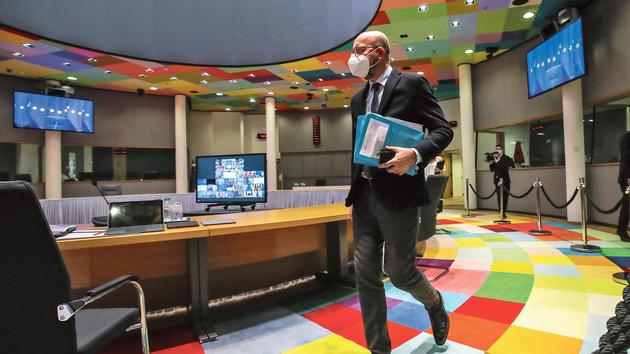Correspondent in Brussels
The meetings of the Twenty-Seven devoted to Covid-19 have been linked since last year on a monthly basis.
And Member States seem, once again, to find it increasingly difficult to move forward together.
By 2020, tensions had crystallized over border closures.
The attention of the Twenty-Seven is now focused on certificates and other vaccine passports which could become, this summer, weapons in the competition between Member States.
Read also:
Has France become the country that vaccinates the most in Europe?
While participating in a new videoconference on Thursday, the leaders once again discussed the contours of this future certificate called for by certain countries anxious to prepare for the summer season, in particular Greece, Spain or the 'Austria.
France, Germany, the Netherlands and Belgium are much more careful.
The reflection will continue.
"I will not accept a system where we will condition the access of a particular country to a certificate," warned Emmanuel Macron.
Our young people will not have been vaccinated at the end of June or the beginning of July.
We are not going to tell them: “You will not be able to move from one region to another, because you do not have the vaccination certificate”.
It will take a test strategy or something else ”
.
As for borders, little was said about them.
While the variants worry Europeans a lot, the restrictions put in place in recent days find, in the end, little echo from the side of the majority of heads of state and government, when the flows of goods and services circulate. properly in the domestic market.
“It's no longer a problem.
We learned to manage, ”
confides a diplomat.
The freedom of movement of people is also relegated to the background.
What the Twenty-Seven admitted in hollow in the conclusions of their meeting:
"Non-essential travel must be limited
.
"
More broadly, faced with a situation that they consider
“serious”
, they called for maintaining
“strong”
national anti-Covid measures
.
Fraudulent offers
Salvation will come from the take-off of vaccination campaigns.
The President of the European Council, Charles Michel, has been very cautious on the subject.
“The next few weeks will remain difficult in the field of vaccination,”
he admitted, also calling for
“improving the sequencing capacities”
of the virus to monitor its mutations.
As for the leaders, they put maximum pressure on the system, urging to
"urgently accelerate the authorization, production and distribution of vaccines, as well as vaccination"
.
Doses continue to be sorely lacking in the Union.
Delivery delays accumulated in January and February, in particular from AstraZeneca, which should deliver only 40 million doses by the end of March instead of the 90 million listed in the contract signed with the Commission.
The greatest confusion reigned Thursday over the ability of the Anglo-Swedish group to provide the EU with the 180 million units expected in the second quarter.
The new Italian council president, Mario Draghi, was particularly firm during the meeting, advancing the idea that the exports of companies that do not meet their commitments should be blocked, while Emmanuel Macron suggested to extend export authorization to vaccine components.
Read also:
Vaccines: how Europe fell behind
Given these shortages, the likelihood of some member states turning to Russia and China is increasing.
After Hungary, Slovakia and Croatia are now thinking of ordering the Russian vaccine, Sputnik V. Added to this is the appearance of fraudulent offers on the continent.
According to the European Anti-Fraud Office (Olaf), several Member States have already been offered some 900 million doses billed for a total of 12.7 billion euros.
The Twenty-Seven, however, want to move forward.
As they prepare to strengthen Europe's health sector to respond to health emergencies, they instructed the Commission to report on the lessons to be drawn from the Covid-19 pandemic.
It will be presented in June.

